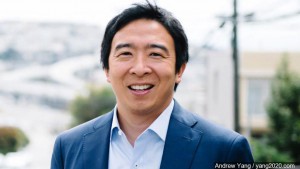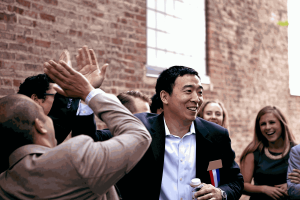Washington, D.C., May 10 — In November of 2017, Andrew Yang, the son of Taiwanese immigrants and an entrepreneur from New York, entered the 2020 Presidential campaign. Yang, the author of the “War on Normal People,” is running on the idea that average Americans are ill-equipped to survive in our economy, where there is increasing levels of income inequality.
His campaign, like his book, discusses the economic impact of workplace automation and our options for the future, including the idea of instituting a Universal Basic Income (UBI) of $1,000 per month to every American. He calls it the “Freedom Dividend,” and believes it will spur the economy and level the income inequality.

Many of the issues he describes, from workforce automation to income inequality, strikes at the heart of the disability community, and Yang would be well-served to include them in the conversation of “normal” Americans. Indeed, according to the CDC, people with disabilities comprise 25 percent of our country’s adult population, and more than half of Americans have a loved one with a disability. A recent survey shows that fully three-quarters of likely voters either have a disability themselves or have a family member or a close friend with disabilities. Thus, for a presidential candidate to represent all Americans, he must include people with disabilities.
Yang’s Autism Early Intervention Program Is Personal
Yang is the father of two sons, one of whom is on the autism spectrum. The issues of early intervention and erasing stigma for people with autism is not just important to him. It’s personal. He believes so much in his Autism Intervention Program and Funding that he discusses them in person and on his website – something no other candidate in this race has yet to do. On his campaign website, he writes,
“One of my boys is on the autism spectrum—I know how invaluable resources and intervention can be, particularly if adopted early on. Families struggle with this in very personal ways. As a country, we should provide ample resources to parents to be able to intervene to support the development of children with autism or who are exceptional in other ways. Many of these children have something unique to offer.”

At a CNN Town Hall last month, a young man with Autism Spectrum Disorder asked Yang what types of support he would provide as President for Americans with autism. Yang responded by proudly stating that his son has autism. He also discussed his plan to “dramatically re-double and invest in helping families with children who are developmentally different or neurologically atypical.”
“As president, I would champion a federal program to help funnel money into the schools and our communities, and make sure that burden is not on the states,” he added. “This is a federal responsibility and a federal initiative I would be thrilled to lead.”
Yang also stressed the importance of erasing the stigma attached to those on the spectrum, most importantly by doing what he is doing – proudly admitting that you or your loved one is on the spectrum. “As a parent of someone who is neurologically atypical, I now think that atypical is the new typical,” he said. “I’m fairly confident I’m not the first politician or even presidential candidate with autism in their family. But for whatever reason, it’s swept under the rug as something to be ashamed of, which, to me, makes absolutely no sense. But anyone who has autism or is on the spectrum in their family feels the exact same way.”
Automation Affects People with Disabilities
Yang’s primary issue is workplace automation, which already has replaced 4 million American workers with robots and threatens 800 million more jobs. Yang posts videos on social media of robots stocking shelves and cashiers being replaced by self-checkout machines. And he discusses, in depth, the consequences of this new step in industrialization.

Most commonly, he emphasizes what happens to workers who have been replaced by automation, saying that half of them leave the workforce entirely, and a quarter go on disability. “[T]here are now more Americans on disability than work in construction, over 20 percent of working-age adults in some parts of the country,” Yang said in a Freakenomics podcast discussing his book. Indeed, when unemployment goes up, so does the amount of Social Security Disability Insurance (SSDI) applications. And there are some communities, known as the “Disability Belt,” where disability benefits impact a big chunk of the population, due to poor health caused by extreme poverty. However, the number of people on disability benefits has decreased over the past four years as more and more people with disabilities have entered the workforce. And, when looking at the data, there are more construction workers in this country than there are people with disabilities receiving benefits.
Moreover, in a recent interview Yang shared on Twitter and YouTube, he discussed the trappings of disability benefits that create disincentives for reentering the workforce. Yang explained that the national disability “churn rate,” or the rate at which people come off disability benefits is “literally 0” percent. In reality, the return rate is between 4.8 and 12.3 percent, depending on the age, education and disability of the individual. Nevertheless, he is justified in pointing out the flaws in our disability benefits programs that prevent recipients from regaining employment.
Yang points out that many unemployed workers end up acquiring mental health disabilities. He explains that unemployment from automation causes rising rates of suicide, overdoses and opioid and alcohol addiction. In a podcast interview, he stated, “another significant percentage will start drinking themselves to death, start committing suicide at record level, get addicted to opiates to a point where now eight Americans die of opiates every hour.”
Further, automation disproportionately targets those who already have a disability. Today, only 65 percent of students with disabilities graduate high school and only seven percent complete college. They squarely fit within Yang’s definition of the typical American. However, unlike the average American, only 1 in 3 people with disabilities is actually employed, despite greater than 70 percent who want to work. Of those who are employed, many work in positions that are either currently becoming automated or are slated for future automation. Indeed, employers with a strong record of disability employment, like Walmart, are struggling to adapt to automation without disparately impacting their disabled workers. Yang would be well-served to recognize the disproportionate impact automation has on workers with disabilities and address how he plans to improve the disability unemployment rate.
Yang’s Freedom Dividend and Social Credits Help People with Disabilities Less
Yang’s ultimate policy to rectify income inequality and rising unemployment from automation is to implement a UBI or “Freedom Dividend.” Under this system, many Americans would be eligible to receive $1,000 per month from the government. “We currently spend between $500 and $600 billion a year on welfare programs, food stamps, disability and the like,” Yang stated. “This reduces the cost of Universal Basic Income because people already receiving benefits would have a choice but would be ineligible to receive the full $1,000 in addition to current benefits.” Thus, people with disabilities, who receive disability benefits and experience the highest rates of poverty, will be ineligible to receive the full UBI.
At the CNN Town Hall on April 14, 2019, an audience member asked Yang how his Freedom Dividend would impact, among others, people with disabilities. “The Freedom Dividend does not solve all problems for all people, but hopefully it will move us in the right direction,” he said. In short, it will not help people on disability as much as it would a millionaire, who does not need an extra $1,000 per month.
Yang also proposes a social credit system, which encourages Americans to be charitable and kind to each other. Under his proposal, Americans can register to earn social credits. Once registered, they will receive alerts, notifying them of community members in need of things like a ride or handy work. After the registered citizen accepts and completes the task, he will receive credits, akin to credit card points, which he can ultimately exchange with the government for cash. This system could certainly benefit people with disabilities and other vulnerable communities, by creating an incentive for others to help. However, Yang has yet to explain how the disability community might also be able to earn social credits and some extra spending money, while also giving back, instead of just being a recipient of help..
Yang Sends a Potentially Dangerous Message on Mental Illness
When Yang appeared at the CNN Town Hall on April 14, 2019, he was asked how he would address the issue of gun violence in America, particularly mass shootings. Yang immediately talked about mental health, implying that mental illness causes mass shootings, an idea that has been disproven by numerous academics.

“I would invest in a massive mental health initiative because if we can help get mental health resources into the hands of more Americans, we can address some of these incidents of gun violence before they happen. My brother is a psychology professor, and I know that we can do much, much more. We have a mental health crisis in this country, and we need to rise to the challenge in addressing it.”
A 2016 academic study found that only four percent of violence is related to serious mental illness alone. The study concluded that “[e]vidence is clear that the large majority of people with mental disorders do not engage in violence against others, and that most violent behavior is due to factors other than mental illness.” And a 2015 study estimated that fewer than 5 percent of gun-related killings in the United States between 2001 and 2010 were committed by people diagnosed with mental illness.
While Yang is correct in stating that there is some correlation between mass shootings and mental illness, his response sends a potentially dangerous and misleading message that people with mental health disabilities are violent and responsible for our country’s gun violence epidemic. People with mental illness are dramatically less likely to commit gun violence than those considered mentally healthy. Indeed, they are more likely to be victims of gun violence.
Finally, unlike Yang’s statement that “we have a mental health crisis in this country,” the New York Times has reported that Americans do not appear to have more mental health problems than other developed nations of comparable size, which actually experience far fewer mass shootings than the U.S..
Even worse, Yang gives unmerited credence to his statements by adding that his brother is a psychology professor. The evidence proves that his statements are misleading. Statements such as Yang’s only serve to further the stigma of those with mental health conditions. Yang, who is dedicated to erasing the stigma of people with austim, would be better-served by correcting these statements and proving to the entire disability community that he is committed to erasing the stigma attached to people of ALL disabilities.
Ensuring Disability Inclusion Through Equal Access
For a presidential campaign to be fully inclusive of people with disabilities, it needs to meet the following requirements: (1) offer captioning with every video it shares or produces, (2) mention people with disabilities and their issues, (3) depict people with visible disabilities in its media, (4) reach out to the disability community, and (5) provide accessible campaign events and website. Given that Yang is a political outsider, he has done pretty well in meeting these requirements. But he still has much room for improvement.

Unlike most of his rivals, Yang has not released an official presidential announcement video. However, the videos he shares of interviews, short speeches or an amalgamation of clips, inconsistently include accurate captioning. As mentioned above, he has done a better than average job at discussing people with disabilities and their issues on the campaign trail as well. And, he has made a point to reach out to the disability community, by working with the National Democratic Disability Caucus and speaking to its members.
However, the campaign recently made local news when the Iowa Gazette reported that one of its residents, a disability advocate, who is a wheelchair-user went to participate in a Yang campaign event, only to find that the event was only accessible by stairs. The Yang campaign did not respond to the Gazette for comment. But the campaign now has a staffer charged with disability inclusion, who has communicated the campaign’s dedication to be fully inclusive of people with disabilities.
Yang might be a political outsider, but he is no stranger to success or making social change. He has raised more campaign donations than ever expected. And every day, he is gaining greater name recognition. If he hopes to rise in the polls or even win the presidency, however, it is critical that he do more to include people with disabilities in the conversation and make campaign events, videos and all media accessible. When so many people with disabilities experience the very issues Yang highlights, he cannot go wrong by including them in the conversation.
Upon reading about Yang’s plan for UBI I felt concerned because for myself and many others it does absolutely nothing. I paid into the system for years and as a result I make a little over 1K a month. It’s extremely hard living off of that and being in a wheelchair is rather expensive from pouring and building inclines, elevators, doors with additional widths, special toilets, special showers, special cars, etc. Andrew Yang leaves me exactly where I was at before. No benefit. Meanwhile, those that can get employed and can work 65+ hours a week get an additional 1K. Sweet. If I work I can struggle to make what I do now and lose all healthcare. His concern only seems to be money as well. What about the healthcare benefits? If someone on disability goes back to work they aren’t going to get insured. They will go broke. An ER visit for me can cost 30K just because of the tests needed. Disabilities leave many of us as being unreliable too. I’m in amazing shape, but I don’t know if I’m going to get out of bed properly tomorrow or crawl out. I can work one week, but not the next.
Andrew Yang is doing absolutely nothing to help the disabled. I’ve always been a democrat, but I’m not going to lie anymore. They do nothing for us. Obama destroyed my healthcare. In fact, he milked it dry to give to other people. Democrats voted against a healthcare fund for me in the 80’s. Yang will do the same. Don’t trust these people. Our monthly benefits are not a benefit. It’s a punishment and our ability to move ahead just gets farther and farther away.
I was a huge fan of Yang until I found out his UBI will be denied to people on disability benefits (SSDI), and to people receiving food stamps, etc. Wow. I thought he was super progressive. He said in a video that someone he knew didn’t want to do community service or she’ll be “outed” for her disability, and lose her benefits. In this way, he’s thinking like Republicans – that people on disabililty are lazy creeps who are fraudulent. WOW. Most people on disability are legitimately disabled, and would do anything to be able to have gainful employment and not receive government help. People on disability are some of the poorest people in America, far below the poverty line – especially if they live in high cost of living areas.
Yang has looked into many policies very closely – but he’s failed to hear/research what SSDI is really about. His denial of UBI to people on food stamps and other public benefits is also kind of Republican – like saying these people are lazy creeps wanting a free handout – when there are, of course, complicated and legitimate reasons going into why people are on public benefits. He’s denying the UBI because he thinks disabled/poor people are fraudsters, and it’s either the $1,000 “Freedom Dividend” or whatever they’re getting in public benefits.
He needs to talk to actual legitimately disabled people on SSDI. They need to explain their situation in detail. He needs to go to the SSDI site and read up more about what it actually is. For someone who sells himself as so nerdy with so many detailed and interesting policies – his failure to know and read up on SSDI and their recipients is pathetic.
His $1,000/month sounds like a very popular/populist plan that many people would be excited about – but denying the “Freedom Dividend” to the people who NEED IT MOST is shocking and hurtful. So a young techie in San Francisco making $200,000 a year and getting free everything from their generous employer – free healthcare, free catered meals, gym, massages, yoga, etc. – will get the extra $1,000/month on top of their already-huge disposable income. An extra $1,000 to spend on overpriced coffee, high-end clothes, gadgets they don’t need, or cool vacations.
Meanwhile, people on a tiny SSDI benefit, some of the poorest people in the US – legitimately disabled people, good, honest people – are DENIED the $1,000, when we NEED IT MOST? That’s a travesty.
I was a huge supporter of Yang and had just joined the Yang Gang to help organize – but once I heard it’s denied to people on SSDI and other public benefits – I’m renouncing him completely. I don’t know if giving him accurate information, or if he heard from actual disabled people, he’d change his mind and offer the UBI to disabled people as well. I thought progressive publications were kinder to people on disability – as I read in an article in a progressive site about women on disability trying to return to work or be self-employed. Someone needs to give him good and accurate information about actual people with disabilities. Is he really moving America forward, as he claims?